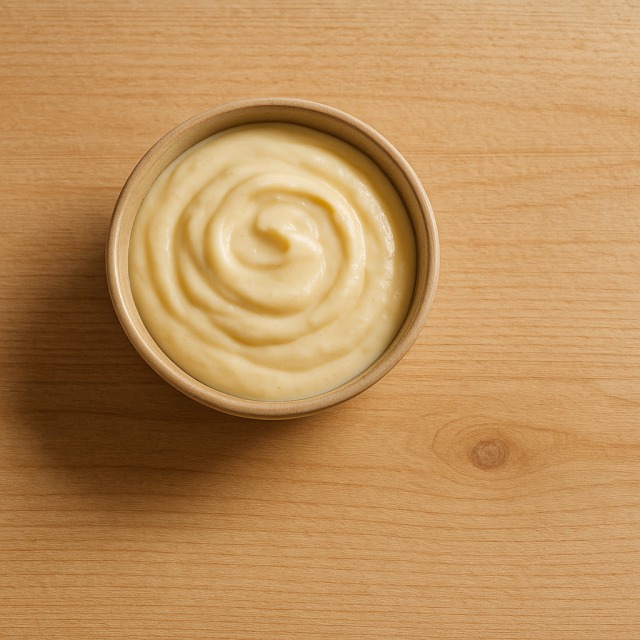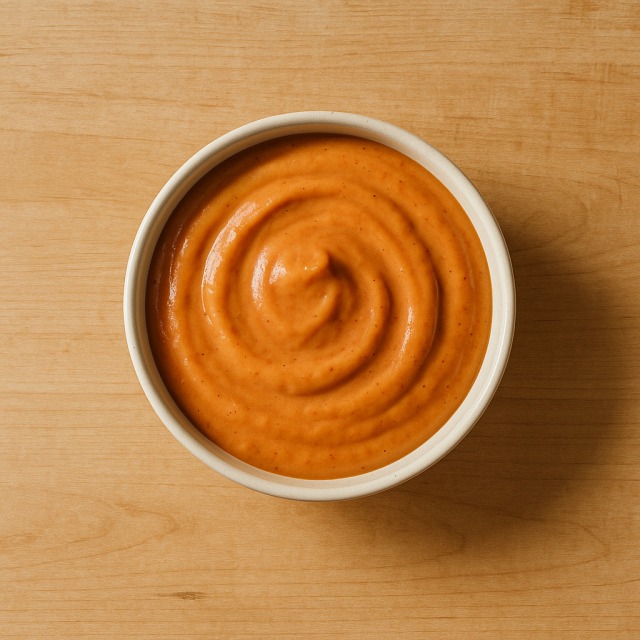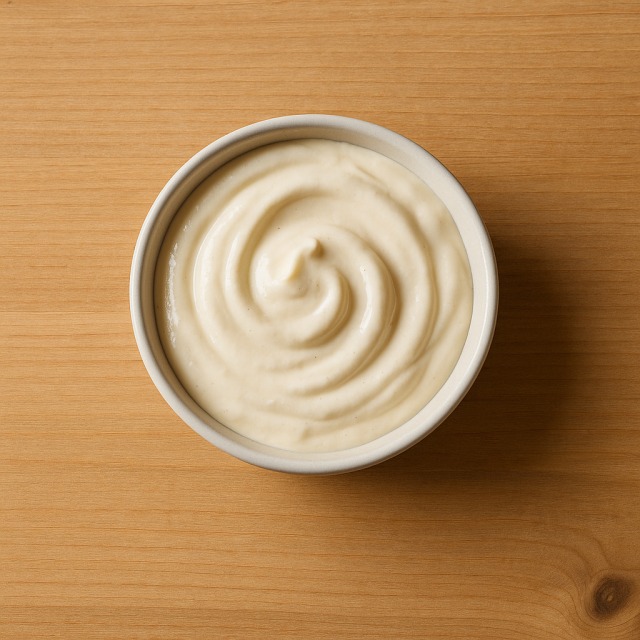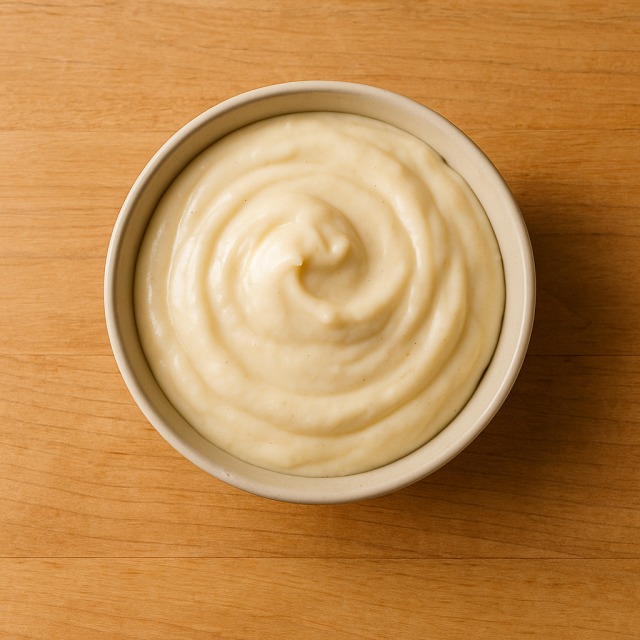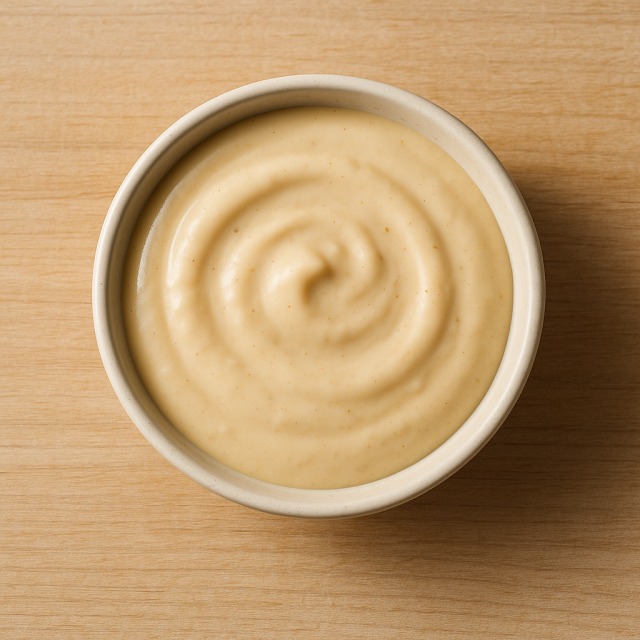Calorie Chart / Seasoning & Sauces / Robert sauce
How Many Calories Are in Robert sauce?
Calculation of the nutritional value & Recommended Dietary Intake of Robert sauce
For g and a calorie requirement of kcal
| Calories 59 kcal | Proteins 0.6 g | Lipids 4.2 g | Carbohydrates 4.7 g |
| 3% | 1% | 6% | 2% |
Health benefits of Robert sauce
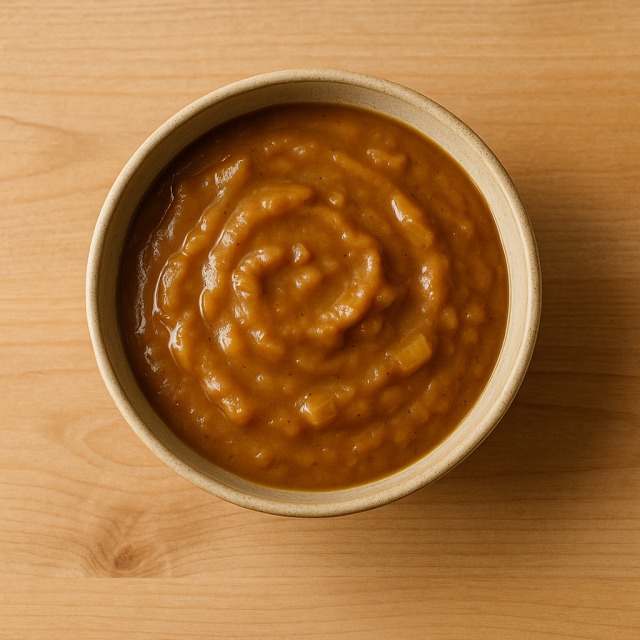
Robert sauce - 100g
Calories 392 kcal
Proteins 4 g
Lipids 28 g
Carbohydrates 31 g
Robert sauce is classified as a high-calorie condiment: with 392 kcal per 100 g, it can quickly raise the calories of a dish if portions are not controlled. Those calories come mainly from lipids (butter or demi-glace) and carbohydrates (wine reduction and flour), while proteins remain modest. Nevertheless, the recipe is built around onion and mustard, two ingredients that add more than flavour. Onion supplies vitamin C, vitamin B6, and the antioxidant quercetin, whereas mustard seeds provide selenium, magnesium, and a trace of omega-3 fatty acids. Even in a small serving, these micronutrients contribute to immunity and normal energy metabolism.
Because the sauce is reheated but not boiled, part of the mustard's allyl-isothiocyanate survives; this compound is reputed to stimulate digestion and nasal decongestion. Historically, Robert sauce appeared in 17th-century French court cuisine and was codified by Escoffier; its enduring popularity shows that flavour sometimes outweighs concerns about calories. Finally, the intense taste encourages the use of a smaller quantity, a strategic way to limit calories while still enjoying a gourmet note.
Tips for incorporating Robert sauce into a balanced diet
To keep calories under control, aim for two tablespoons (≈30 g) of Robert sauce per serving; that is about 120 kcal added to the plate. Pair it with lean meats such as a grilled pork tenderloin, a seared turkey cutlet, or roast chicken breast; the proteins balance the lipids and help satiety. On the side, choose steamed broccoli or green beans instead of fries: you will save hundreds of calories and boost fibre.
If you love the classic "saucisse à la Robert", replace part of the sausage with a smaller piece of Toulouse sausage and bulk up the plate with mashed potato prepared without added cream. Counting calories this way lets you enjoy tradition without excess.
Need a lighter twist? Deglaze the pan with vegetable broth instead of wine, use light butter or a tablespoon of light crème fraîche, and thicken with cornstarch. The flavour remains sharp while calories drop by roughly a third. Remember: whatever version you choose, always measure the sauce first; visual estimates often underestimate calories.
Frequently Asked Questions
- How many calories are in Robert sauce?
- Robert sauce provides 392 kcal per 100 g.
- Is Robert sauce suitable for a low-calorie diet?
- Because it is high in calories (mainly from fats), Robert sauce is not ideal for very low-calorie plans. A 30 g portion supplies about 120 kcal, so it can fit if the rest of the meal is light and the day's calorie budget allows.
- Which dishes traditionally use Robert sauce?
- Classic pairings include "côte de porc sauce Robert" (pork chop), grilled sausages, and roasted poultry. The sauce's acidity balances the richness of meat without adding excessive salt, though it does add calories.
- How can I cut the calories of my homemade Robert sauce?
- Use light butter, skim the fat from the pan juices, replace demi-glace with reduced vegetable stock, and thicken with cornstarch. These adjustments can reduce calories by up to 35 %
- Does reheating Robert sauce change its calories?
- No. Reheating may slightly evaporate water, making the sauce thicker, but the total calories remain essentially the same; per-spoon calories might even rise if the volume reduces.
- Is Robert sauce gluten-free?
- Traditional recipes contain flour, so they are not gluten-free. Replacing flour with cornstarch both removes gluten and leaves the calories almost unchanged.
Similar foods
Information provided by Calorie Menu may contain inaccuracies or errors. It cannot, under any circumstances, substitute medical advice or medication.
